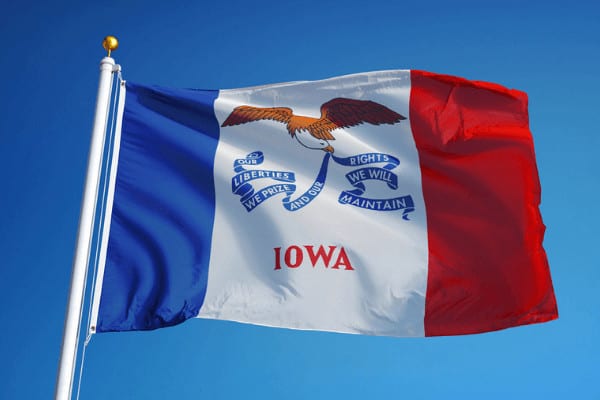
Unclaimed Money Lookup - Iowa
Free Iowa Unclaimed Money Lookup
We receive referral fees from partners (advertising disclosure)
The information we provide you is free of charge and a result of extensive research by our home warranty experts. We use affiliate links on our site that provide us with referral commissions. While this fact may not influence the information we provide, it may affect the positioning of this information.
(advertising disclosure)
The information we provide you is free of charge and a result of extensive research by our home warranty experts. We use affiliate links on our site that provide us with referral commissions. While this fact may not influence the information we provide, it may affect the positioning of this information.

Iowa Unclaimed Money -
The Ultimate Guide 2026
- UPDATED February 2026
Find out the best way to claim unclaimed property in Iowa and track down money from banks and others that belongs to you.
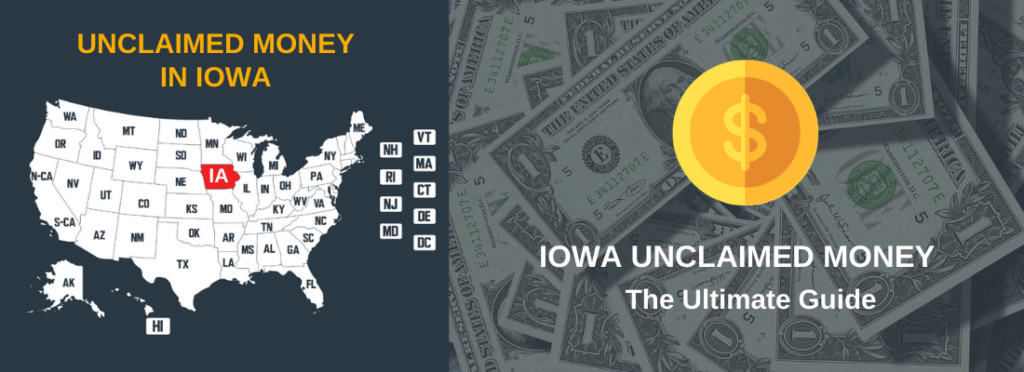
Unclaimed Property in Iowa
With nearly 100 counties scattered across the state, Iowa has hundreds of companies that have money for residents. Though Polk County is the largest with more than 400,000 people, you may have money held for you in any city or county where you once lived. The Hawkeye State launched the Great Iowa Treasure Hunt website as a way for residents to find their missing money. Through this site, the state returned more than $296 million in claims. Operated by the State Treasurer Office, the website lets you search for cash and property if you live in Iowa or any other state. In our ultimate guide to unclaimed money in Iowa, we make sure that you find any type of property that you can claim online.
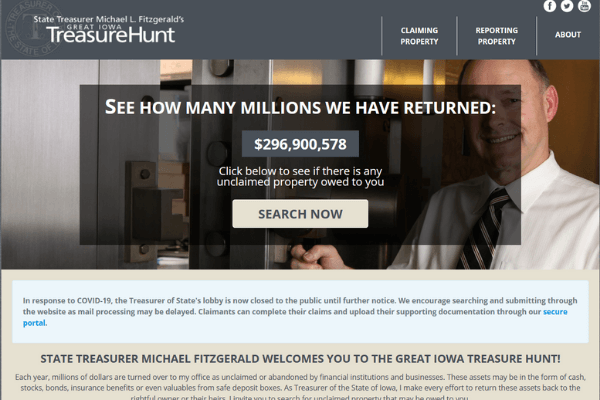
What is Unclaimed Property?
According to the State Treasurer, more than 62% of the funds held by the state include all types of checks. Did you switch bank accounts and get a promise that the new bank would issue a check? If the check never came, the website should list it. Checks can also include those that someone wrote to you that you never got around to cashing. Though many assume that the checks are no longer good once the statute of limitation passes, the money that the check promised is often still available.
Roughly 16% of the funds that Iowa holds for others come from insurance payments. If you owned or rented a home in Iowa and had a claim through an insurer, any money that they tried to send you that came back will be in the database. This includes money that you earned after filing a claim as well as money given to you after an accident.
Life insurance policies also appear in the database and may include funds that you didn’t know you could claim. Not everyone leaves detailed information to tell their loved ones about the insurance policies that they had. You may find a large check held by the State Treasurer from a policy that listed you as the primary beneficiary.
More than 5% of the funds listed in the Great Iowa Treasure Hunt database include unclaimed wages and utility deposits/refunds. Most utility companies do a background check when someone signs up for service and charges them a deposit. You may have the deposit credited to your account or returned to you as a check. If you never claimed your money, you should find it in the database. Iowa also holds utility refunds that often come from companies that issued checks for the balance on an account when the owner closed it.
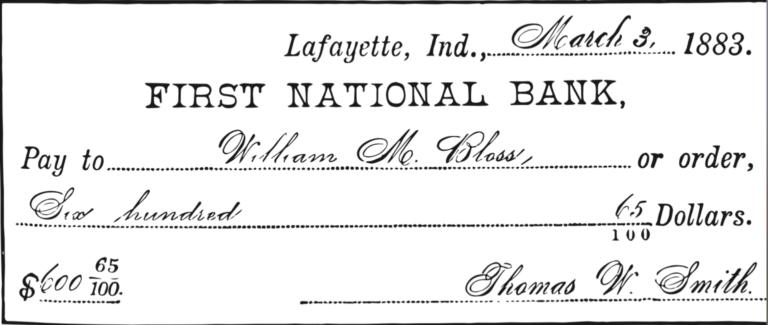
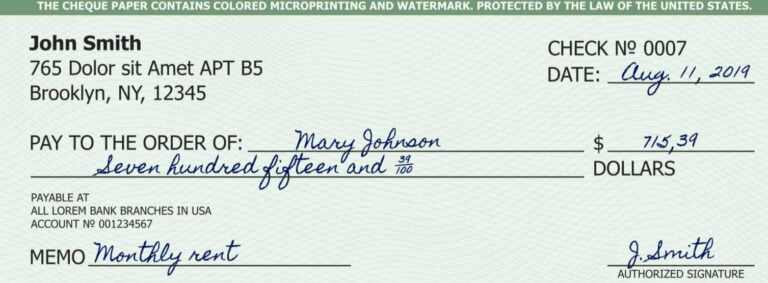
With unclaimed wages, the state helps you find money that you made on a past job. Not only can you find checks for any unpaid expense reports that you filed and vacation time that you never got, but you may find money from an employer who made a mistake with one of your past checks. The Iowa database also lists a small number of trust and escrow accounts. If you bought a new home and sold your old home, your mortgage provider may have some money left over from your escrow account that you deserve. You can also search for all types of savings and checking accounts held by banks as well as safe deposit boxes.

How to Find Unclaimed Property in Iowa
The Great Iowa Treasure Hunt website operated by the State Treasurer helps you find money owned by an individual owner or a business and allow you to claim your money, too.
Step 1: Visit the Great Iowa Treasure Hunt website. This link will take you to the search page.
Step 2: Look for the search box on this page and enter your last name. If you want to search for assets owned by a business that you owned, you can also use its name. Iowa recommends that you use the property ID if you received an official letter from the treasurer.
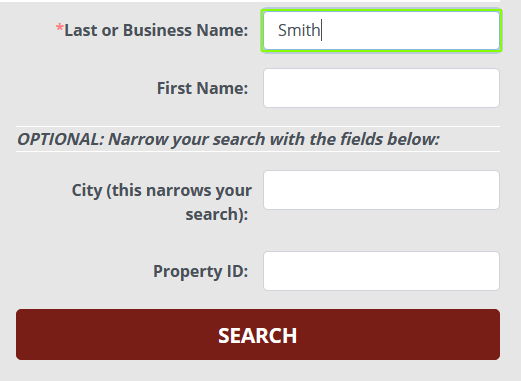
Step 3: Use the results that Iowa finds to uncover any claims that you can file. The database will show whether the account has one or more owners and the full address of the owner. You can also see if the amount is more or less than $100 and who reported the account. Iowa also lists the type of property such as a refund check or unclaimed wage. Not all accounts will include a property type.
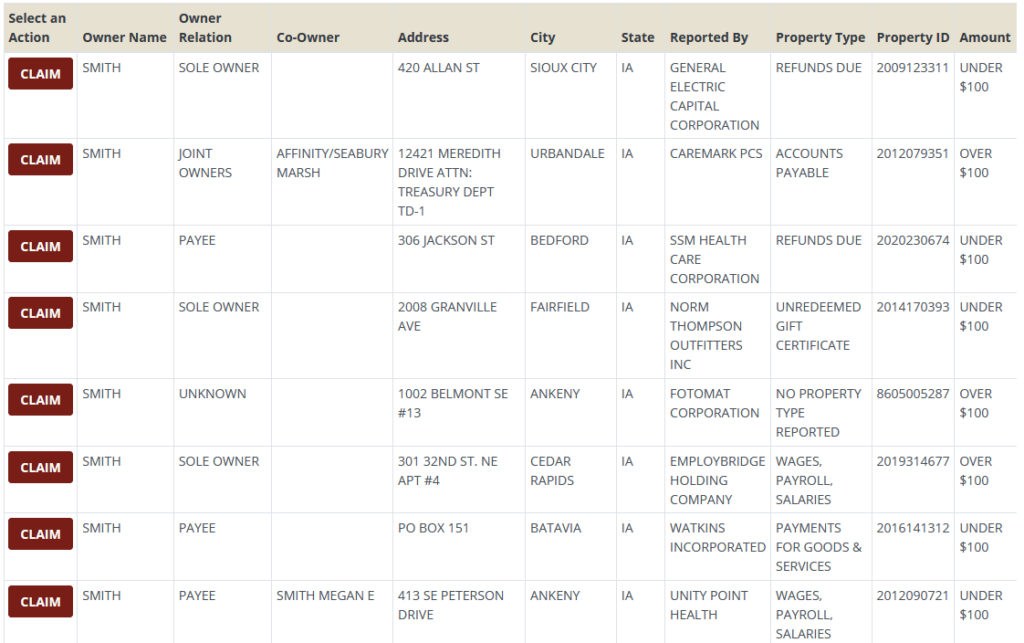
Step 4: To claim property in the Iowa database, you need to look for the red “Claim” button next to the property and click on it. You can then scroll down until you see the “File Your Claim” button, which allows you to file as the owner of the property.

Getting Unclaimed Money in Iowa
Though you can easily find money through the Great Iowa Treasure Hunt database, there are other steps associated with claiming the money and getting it.
Step 1: Follow the steps above to reach the Claim Unclaimed Property page. Verify that the information on the account matches both your name and the address where you live or lived.

Step 2: Click on the “Claimant Relationship” menu to select how you want to claim the property. Though many file as the owner, Iowa allows individuals to file as business or estate representatives and heirs.
Step 3: Supply your contact information on the form on the next page. Iowa does not require that you file at the address shown on the account if you no longer live there but asks for your current address. You also need to supply your first and last names and answer whether anyone offered to file for you.
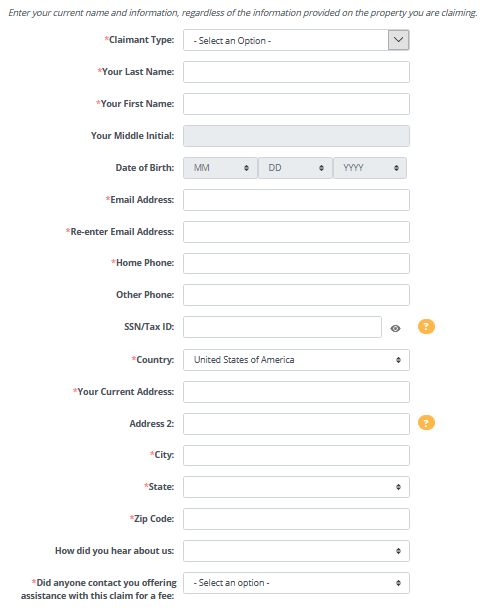
Step 4: Upload all the required documents that support your claim on the upload site. You need to click a box that shows all the information you shared is true and that all of your documents meet the requirements. Iowa also asks that you enter the email address that you used when filing and the property ID. You will need to upload documents to support each claim that you file.
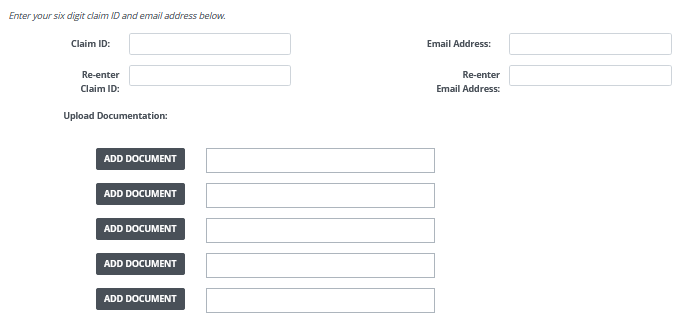
Where Else Can I Find Unclaimed Property?
While the Great Iowa Treasure Hunt website is the first place to look for unclaimed property in Iowa, you shouldn’t forget about sites that hold property in other states as well as federal funds. Did you live and work in multiple states over your career and don’t like the idea of checking each state for databases? With Missing Money, you have the chance to look for property under your name in several states, including both those in the Midwest and other regions. You can also file your claims online rather than waiting for forms to arrive in the mail.
At the U.S. Federal Investments website, you can get help finding treasury bonds that you no longer have in your possession. As long as someone bought a bond in your name, you have the right to the money associated with it. The Internal Revenue Service (IRS) offers similar resources for those who think they have federal refund checks. In addition to helping you claim refund checks, the IRS can help you look up past returns and check on stimulus money.
Other sites that we recommend using as you search for unclaimed property include:
- Federal Deposit Insurance Corporation: Banks must have insurance to protect the funds that customers leave with them. This website lets you search for the money that you had in an account at a bank that shut down.
- Department of Veterans Affairs: Often referred to as the VA, this government department helps veterans get the benefits owed to them. It also offers resources for families of veterans who had VA life insurance.
- Department of Housing and Urban Development (HUD): Even if you no longer have a HUD mortgage, you can still check the site for refunds that you earned decades ago. HUD has tips on how to avoid scams if someone contacts you about unclaimed money, too.
- Pension Benefit Guaranty Corporation: Pensions provide retired people with money that they can use in their later years. This site offers help to those who need to find a missing pension and claim it.
- U.S. Railroad Retirement Board: You can get help tracking down retirement funds through this website if you know someone with a railroad account. The site provides help for those claiming as a beneficiary, too.
- National Credit Union Administration: Find out where your money went when your credit union dissolved through this site. The NCUA can also help you file a claim to get the money back.
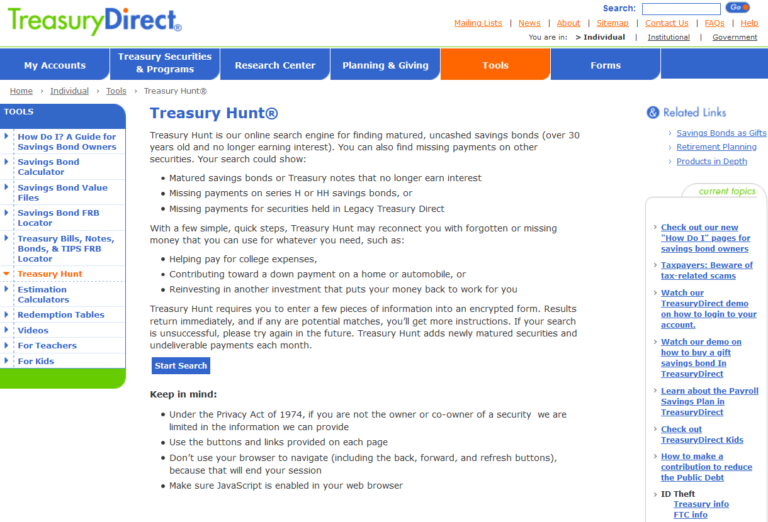
Iowa Unclaimed Property Laws
If you want to learn more about Iowa unclaimed property laws, check the state statutes. You can see how long banks and organizations have until they need to contact the state about abandoned property and what they need to do to report it. The laws also cover some protections designed for consumers.
Unclaimed Money FAQs in Iowa
Who Can File for Unclaimed Property in Iowa?
Iowa helps you file a claim for any property in the database, even if you are not the listed owner. The most common reason why you might file is as a legal heir of a deceased person. You can select the legal heir option when filing if the deceased’s estate did not go through probate or the probate court closed the case. The probate process ensures that the deceased’s will goes through the court system and that the heirs get what the deceased wanted. You may not need to go through probate if you are the individual’s spouse and inherited everything or the estate was worth less than the minimum amount.
The Iowa database has an option for filing as part of an open estate. This is the option that you should choose if you are in the middle of probate and want to claim funds that belong to the deceased. Business owners can file through the system if they owned a business that closed down or if the business is still around. You usually need to provide different documents to file that show you own the business in question.
How Long Does Iowa Take to Process Claims?
We didn’t find any information on how long the treasurer takes to process claims, but the department does process claims as they arrive. Once you file your claim and upload your required documents, the treasurer will add your claim to the list. An easy way to get an idea of where your claim is in the list is through the claim status checker, which requires only the property ID from your form. You can check this page whenever you want to see if the treasurer received your claim and sent you a check.
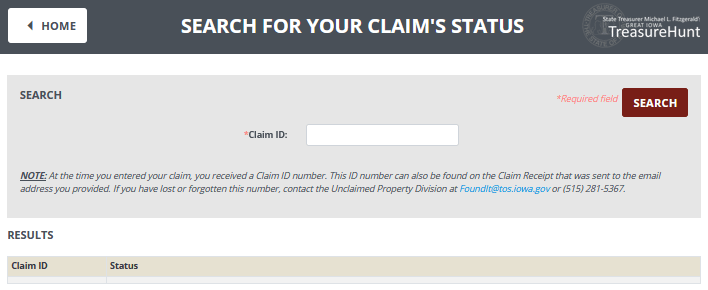
Do I Need Any Special Forms to File in Iowa?
You may need one of two forms to file your claim in Iowa. The first is an Affidavit of Lost Certificate, which the treasurer requires if you file a claim for a stock or bond and no longer have the original certificate. This form must list your name along with the number of stocks that you had and the name of the stock or security. Iowa will only accept this certificate if a notary stamps it. You need to pay for this service and sign the certificate in front of the notary.
Iowa asks for an Affidavit of Administration if you file a claim on the behalf of a deceased’s estate. You need to know the deceased’s full name and last known address as well as the date that they died. The form asks for a copy of the deceased’s obituary and death certificate if there wasn’t an estate. You may need to provide a copy of the deceased’s will or other court documents if you file during probate or after probate closed. A notary must sign and stamp this form before you can submit it. You can find PDF copies of both certificates here if you need them.
How Much Unclaimed Property is in Iowa?
The most recent report from the State Treasurer claimed that Iowa has $429 million in unclaimed property held in its database. That database helped more than 560,000 users find and get back more than $295 in unclaimed funds since it started. Roughly one out of every 10 people who live in The Hawkeye State have some type of unclaimed money waiting for them.
What Does Iowa Do to Return Money to Owners?
Unlike other states that rely solely on their databases to find owners, Iowa takes many steps to track down the rightful owners. The State Treasurer often talks to local media sources across the state to bring awareness to the database and encourage people to search. It sends a list of names added to the database to local newspapers as a way to reach people who may not know that they have missing money. Iowa also checks tax records to find the last known addresses of the owners and will send notices to them. If you receive a notice, it will list the property ID to help you find your account. You may see representatives setting up at the state fair and county fairs, too.

Does Iowa Charge Fees to File Property Claims?
No, the Great Iowa Treasure Hunt website is always free to use. Iowa guarantees that you do not need to pay to search the site or when you file a claim. It also does not charge fees for heirs to file claims. You are responsible for paying any notary fees when you need notarized documents. Most of these professionals charge a minimum of $10 per document. You usually only need notarized documents when filing claims as an heir or for stocks. Some accounts that are worth more, as well as business assets, require notarized documents, too. You will also need to pay someone to handle the search and claim process for you. Often called fee finders or money finders, these are people who do thousands of searches every year and notify both owners and their heirs. You can search and claim property through the Great Iowa Treasure Hunt website without relying on a finder.
What Happens to Abandoned Safe Deposit Boxes in Iowa?
Iowa law requires that banks and others who hold safe deposit boxes report abandoned boxes by November first every year. An abandoned box is one that the owner does not access for a period of one year or longer. The bank can only open the box and examine the contents after the owner does not make a rental payment for a minimum of one year. State law requires that they create a digital record that lists all items found in the box, including securities, coins and other valuables. If the bank finds a firearm, it must contact the authorities. Law enforcement will determine whether the gun is safe to turn over to the treasurer.
The laws of the state also give the treasurer the legal right to auction abandoned boxes. When the contents sell, the treasurer will set aside the money raised and hold it for either the owner or their heir. The treasurer will not auction any military or service medals. Iowa does not hold auctions as often as other states do. In 2017, the treasurer returned the full contents of a safe deposit box to a man who lost it in 2012. In most cases, Iowa will require that you pay any money owed to the bank to get back your box.
Does the Iowa Database Include Gift Certificates?
A new law issued in 2014 requires that retailers in Iowa honor all gift certificates and cards that they issue. Those retailers cannot charge fees if you don’t use your card or list an expiration date. This law does not require that the retailers turn over the balances on the cards though. Retailers have the right to turn over the cards. If you find a gift certificate in your name and claim it, you can use it at the business that issued it. The law does not apply to companies that operate in Iowa but have their headquarters in other states.
How Long Will Iowa Hold My Money?
Iowa does not have a statute of limitations on how long it holds money on behalf of others. As soon as an organization reports the missing money, the treasurer will process the account and add it to the database. You can find money from years ago in the Great Iowa Treasure Hunt database.

How Can I Protect My Property?
To protect your property and stop it from showing up in the Iowa database, there are several things that you can do. You should create an estate plan that lists all of the assets and accounts that you own with the information that your heirs need to access them. If you have valuable items stored in a safe deposit box, make sure that you include them, too. Many banks and organizations will contact you and request proof that you’re the owner of an account if someone tries to access it. You should respond to those letters quickly. We also recommend updating your accounts when any of your information changes.
Conclusion
Why dream about winning the lottery when you can search for real property that belongs to you? Iowa helps the owners of unclaimed and abandoned property get their money in a few months or less and lets them start the process online. Use the Great Iowa Treasure Hunt today and our detailed guide to find your money.
Quickly Search For Unclaimed Money
Disclaimer: OurPublicRecords mission is to give people easy and affordable access to public record information, but OurPublicRecords does not provide private investigator services or consumer reports, and is not a consumer reporting agency per the Fair Credit Reporting Act. You may not use our site or service or the information provided to make decisions about employment, admission, consumer credit, insurance, tenant screening, or any other purpose that would require FCRA compliance.
